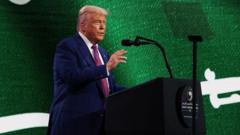In a striking departure from traditional American foreign policy, President Trump asserted that the U.S. will no longer dictate how other nations should live, fostering a swell of reactions across the Middle East and a sense of newfound agency among war-torn nations.
Trump's Shift in Middle East Policy: Embracing Sovereignty Over Intervention

Trump's Shift in Middle East Policy: Embracing Sovereignty Over Intervention
In a bold move, President Trump declares a new approach to U.S. foreign policy during a speech in Saudi Arabia, embracing non-interventionism.
In an opulent Riyadh ballroom on Tuesday, President Trump made a revelatory statement that marks a significant shift in U.S. foreign policy towards the Middle East. “We will no longer be giving you lectures on how to live,” he proclaimed, echoing sentiments that resonate deeply with the audience of regional leaders and citizens alike. His remarks came during an investment conference designed to strengthen ties with Saudi Arabia and emphasized the administration's pursuit of non-interventionism, which he tied to the failures of past American interventions in the region.
As he criticized past nation-building efforts, he rallied support by urging the Middle East to “chart your own destinies in your own way.” His statements ignited applause and were met with mixed responses across social media platforms. Comments from various citizens showcased optimism and skepticism, reflecting a complex landscape shaped by years of U.S. military actions and policies.
Sultan Alamer, a regional academic, highlighted the resonance of Trump’s rhetoric with Marxist critiques of colonialism, while Syrians celebrated the announcement of lifting American sanctions, seeing it as a path toward rebuilding. Yemenis, suffering under prolonged conflict and sanctions, expressed their perspectives on sovereignty and intervention, weighing the implications of Trump's policy pivot.
As the world watches closely, this pivotal moment could redefine U.S.-Middle East relations and potentially reshape the region’s political dynamics in years to come, offering a moment for nations to reconsider their destinies amidst historical challenges.
As he criticized past nation-building efforts, he rallied support by urging the Middle East to “chart your own destinies in your own way.” His statements ignited applause and were met with mixed responses across social media platforms. Comments from various citizens showcased optimism and skepticism, reflecting a complex landscape shaped by years of U.S. military actions and policies.
Sultan Alamer, a regional academic, highlighted the resonance of Trump’s rhetoric with Marxist critiques of colonialism, while Syrians celebrated the announcement of lifting American sanctions, seeing it as a path toward rebuilding. Yemenis, suffering under prolonged conflict and sanctions, expressed their perspectives on sovereignty and intervention, weighing the implications of Trump's policy pivot.
As the world watches closely, this pivotal moment could redefine U.S.-Middle East relations and potentially reshape the region’s political dynamics in years to come, offering a moment for nations to reconsider their destinies amidst historical challenges.






















